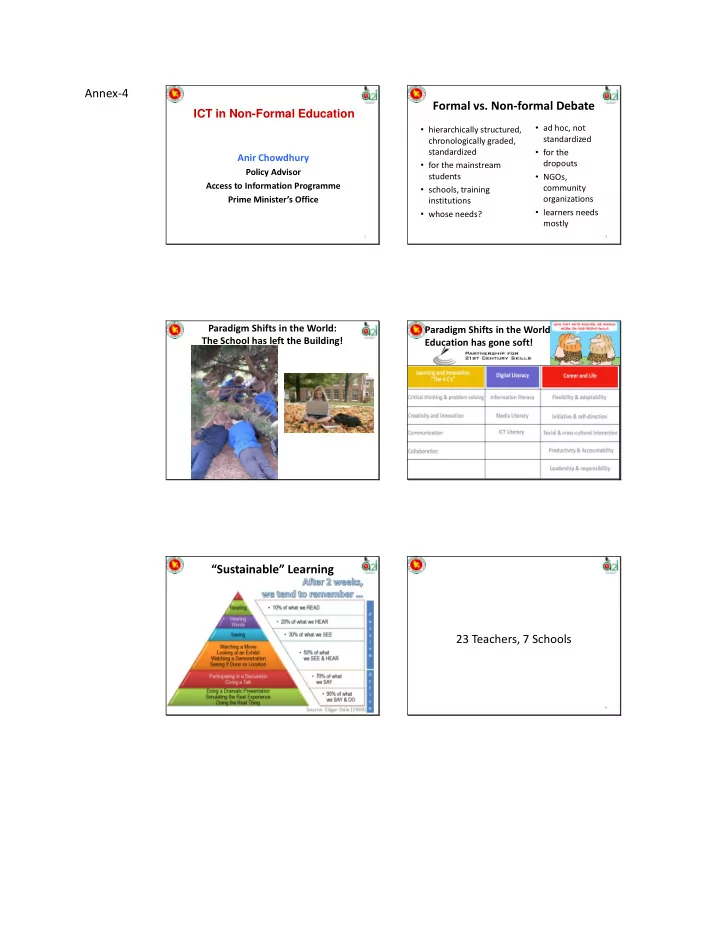

Annex-4 Formal vs. Non-formal Debate ICT in Non-Formal Education • ad hoc, not • hierarchically structured, standardized chronologically graded, • for the standardized Anir Chowdhury • for the mainstream dropouts Policy Advisor • NGOs, students Access to Information Programme • schools, training community Prime Minister’s Office organizations institutions • learners needs • whose needs? mostly 1 2 Paradigm Shifts in the World: Paradigm Shifts in the World The School has left the Building! Education has gone soft! “Sustainable” Learning 23 Teachers, 7 Schools 6
The kind of ICT we need in education ICT in Education ‘Myths’ • Cost-effective 1. ICT in Education = ICT Education • 21 st Century skills 2. ICT Literacy must be TAUGHT to students focused 3. First step is setting up computer labs • Enjoyable and effective for teaching-learning • Students and Teachers friendly • Reduces ‘Digital Divide’ Multimedia Classroom: A Model for the Developing Countries 7 Multimedia Classroom 10 Transform education, not IT education Teachers’ Collaboration Rethinking Teacher Training • Content • Practice • Activities • Collaboration • Mentoring • Competition • Constructivist activities (cannot be pre-packaged) 11 12
Significant Workforce by 2030! Skills Priorities Chart Title • 21 st century skills – Critical thinking Dependent 33% – Problem solving – Collaboration Working Age 67% • Market-oriented skills – Current markets (trades that we know) – Emerging markets (call centre, ship breaking/building) What skills will they have? – New markets (business process outsourcing) For the domestic market? For the global market? 14 Will traditional capacity development channels be enough? Curriculum and Content Curriculum and Content (contd.) • Digital Content (video & animation) for • Trade-based Content (video & animation) – Literacy – Use & repair of Computer, Photocopier – Life skills – Fisheries, Poultry, Nursery – Livelihood skills – Food processing, Candle, Cheese making – Continuing education – Others – Others • ICT literacy – Provide infrastructure and internet if we can afford it nationally – Do NOT provide instruction 15 16 Awareness Building Infrastructure • Early Childhood Care and Education (ECCE) • Internet connectivity • Community Learning Center (CLC)/UISCs • Child labor • Education TV • Child trafficking • Community Radio • Health and Personal Safety • Mobile ICT-Van (awareness building) • Life skills • Interactive and dynamic web-portal for NFE • Livelihood skills • Mobile phone to be explored further as education • Others delivery channel • e-Learning Platform 17 18
Education TV Coordination • Among projects • Among NGOs • Govt. Divisions/agencies • International organizations • Development partners • National and local media • PPP – Attracting private sector investment (not just CSR) 20 An Example of National Policies Successful Coordination • National Education Policy • National ICT Policy Private a2i, PMO Sector • ICT in Education Master Plan UNESCO, U • 6 th 5-year Plan NICEF, UND MoEdu P and other DPs • Curriculum NGOs, CSO MoMPE s Local Govt 21 International Collaboration South-South Network • Good practices • Knowledge sharing for teachers and education South-South Network officers • Exposure and ‘eye - openers’ for policy makers for (both government and non-government) ICT in Education (SSNIE) 23 24
Thank you 25
Recommend
More recommend